

Most ebook files are in PDF format, so you can easily read them using various software such as Foxit Reader or directly on the Google Chrome browser.
Some ebook files are released by publishers in other formats such as .awz, .mobi, .epub, .fb2, etc. You may need to install specific software to read these formats on mobile/PC, such as Calibre.
Please read the tutorial at this link: https://ebookbell.com/faq
We offer FREE conversion to the popular formats you request; however, this may take some time. Therefore, right after payment, please email us, and we will try to provide the service as quickly as possible.
For some exceptional file formats or broken links (if any), please refrain from opening any disputes. Instead, email us first, and we will try to assist within a maximum of 6 hours.
EbookBell Team

0.0
0 reviewsThis work blends strategic analysis of contemporary US foreign policy with long-term historical discussion, producing an important argument relevant to the debates surrounding both the merits of contemporary US foreign policy and the long-term trends at work in American political culture.
Rather than a detailed historical study of the Bush administration itself, the book seeks to locate Bush within the historical context of the US foreign policy tradition. It makes the case for nationally specific ideological factors as a driver of foreign policy and for importance of interaction between the domestic and the international in the emergence of national strategy.
The contemporary element focuses on critiquing the George W. Bush administration’s National Security Strategy, perceived by many as a radical and unwelcome ideological departure from past policy, and its broader foreign policy, concentrating especially on its embrace of liberal universalism and rejection of realism. This critique is supported by the cumulative argument, based upon the historical cases, seeking to explain American leaders’ persistent resistance to the prescriptions of realism. Quinn argues for some causal connection between historically evolved ideological constructions and the character of the nation’s more recent international strategy.
Providing a valuable addition to the field, this book will be of great interest to scholars in American politics, US foreign policy and US history.